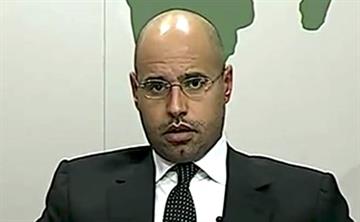Saif Al-Islam Gaddafi, wanted by the International Criminal Court for crimes against humanity, will contest the presidency in Libya during an election expected to start on December 24.
The son of former Libyan president Muammar Gaddafi had earlier been disqualified by the country’s electoral commission but appealed the decision and was reinstated by a court in the city of Sebha.
The commission had cited electoral laws that lock out candidates sentenced for a “dishonourable crime” or having a criminal record.
He was among 25 of the 98 registered presidential candidates disqualified from running in the election.
Saif Al-Islam has been a fugitive for 10 years since the ICC issued a warrant of arrest against him on June 27, 2011 for crimes against humanity allegedly committed in 2011 in Libya. He was accused of playing a key role in planning the suppression of civilian demonstrations “by any means”, including lethal force, against his father’s regime. The alleged attacks occurred in Benghazi, Tripoli, Misrata, and neighbouring towns.
He was the honorary chairman of the Gaddafi International Charity and Development Foundation and acted as the de facto prime minister under the regime of his father at the time of the arrest warrant. In 2015, a court in the capital Tripoli, which tried Saif Al-Islam in absentia, sentenced him, former ICC suspect Abdullah Al-Senussi, and seven other former government officials to death. However, the trial and verdicts generated an international outcry over allegations of serious due process violations. The ICC Prosecutor and civil society groups urged the surrender of the suspects to the court and called on the Libyan authorities not to proceed with their execution. However, the group that had captured him at the time refused to give him up and instead released him two years later. He has not been seen out in public and only emerged to announce his presidential ambitions.
Libya was the first situation on which the United Nations Security Council voted unanimously to refer to the ICC, in February 2011. All the 15 members of the council were in favour of the court taking over the situation, stressing the need to hold accountable those responsible for attacks, including by forces under the control of those responsible, on civilians. After conducting a preliminary examination of the situation, the Prosecutor concluded, in March 2011, that there was a reasonable basis to believe that crimes under the ICC’s jurisdiction had been committed in Libya since 15 February 2011, and decided to open an investigation into the situation.
Libya unsuccessfully challenged the admissibility of the Saif Al Islam case, basing its argument on the principle of complementarity which states that the ICC can only investigate and prosecute a case if the state concerned is unwilling or unable to do so. However the case against his co-accused, Abdullah Al-Senussi, was declared inadmissible on October 11, 2013.
In March 2020, the ICC Appeals Chamber confirmed the admissibility of the case and rejected the appeal against Pre-Trial Chamber I’s decision. The Appeals Chamber stated that the court is “complementary to national criminal jurisdictions”.
His case remains at the Pre-Trial Stage as he is still at large, pending his transfer to the custody of the ICC in The Hague.







